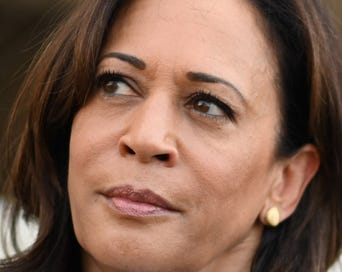Inside Washington: What Biden’s exit indicates about notorious Democrats
Figures ironically seeking the center—at the cost of their political goals—include Bernie Sanders and AOC, as well as Nancy Pelosi and Kamala Harris
Living in interesting times
The past two weeks in U.S. politics have been as tumultuous as the drama presented by the Olympic games. Biden’s exit from the presidential race breathed new life into a moribund election, just after an attempt on Trump’s life had seemed to likely seal the outcome in November.
A closer look, however, reveals that Biden’s exit changed a lot less than most people seem to think. There are important distinctions to be drawn between Biden and Harris, but they are cut from the same political cloth and demonstrated similar approaches both to serving Wall Street and also supporting the policing-prison-slave labor-industrial complex.
On the other hand, other Democratic party leaders revealed a great deal through their statements preceding Biden’s exit, as well as their ensuing reactions. The significance of their changing stances, however, has been largely lost on most observers.
Behind the scenes: progressives fall for a head-fake
In the days before Biden withdrew from the presidential race last weekend, a series of ironic voices emerged to defend his candidacy. Figures who invited fellow Democrats to put their divisions behind them and rally behind Biden—despite his frailty, mounting electoral vulnerabilities, and seeming hubris—included two of his ideological nemeses: Senator Bernie Sanders and Rep. Alexandria Ocasio-Cortez.
This, even after AOC explained years ago on national television that, “In any other country, Joe Biden and I would not be in the same party.” She was right at the time. Biden is a lifelong conservative brought to the White House in 2008 to check and balance what some within the Democratic Party feared at the time would be a progressive inclination within the Obama administration.
On the one hand, reports have emerged that Sanders and Ocasio-Cortez pushed Biden for important policy concessions before choosing to endorse his re-election. For instance, they secured Biden’s support for caps on rent increases and urged him to embrace proposals to eliminate medical debt. Their bargain—supporting Biden in exchange for him supporting policies they have encouraged—would demonstrate a measure of political savvy, had he not proceeded to drop out of the race mere days later.
By endorsing Biden prematurely and inviting Democrats to abandon a necessary public debate, AOC and Bernie each sacrificed their stated principles, while playing an inside game and making a bad public bet.
They each got rolled by the party, demonstrating allegiance to Biden while abandoning the public debate for their vision and appearing oblivious to Biden’s political frailties. It’s the same pattern apparent when Bernie campaigned for Biden in 2020 even after the insider machinations that led the many centrists to drop out and consolidate support behind Biden in order to deny Bernie the nomination. It’s the same pattern that AOC later showed when deferring to Nancy Pelosi despite having led a sit-in at Pelosi’s office on her first day in Congress to build support for the Green New Deal.
Behind the scenes: centrists reveal crass motives
Meanwhile, Nancy Pelosi—representing very much the opposite wing of the Democratic Party—took a very different course.
Pelosi’s dedication to Wall Street is both renowned and largely unrivaled. Over the course of her career, only a few Democrats have done as much as she has to support corporate America. One of them is Joe Biden.
Yet Pelosi seemed to abandon her conservative principles embodied in Biden by playing a reportedly key role in pushing him out of the race.
Why?
Pelosi’s allegiance to the Democratic caucus in Congress certainly helped fuel her decision. With Biden at the top of the ticket, dozens of Democrats in the House and Senate would have been vulnerable in the November elections.
The biggest hole in that bucket is that putting Harris at the top of the ticket may help, but not likely much. Remember: Kamala Harris ran for president in 2020, but did not win a single state primary. Her home state preferred Bernie Sanders by a vast margin.
On the other hand, her emergence as the likely candidate has certainly encouraged the party’s grassroots activists, as well as its ranks of major donors. The impact of that new enthusiasm will reveal itself in time. Given how despondent Democrats had grown in the days before Biden’s announcement to end his re-election campaign, there was nowhere to go but up.
Another hole in that bucket, however, has gone largely unobserved: Pelosi’s own political network. By exhorting Biden to drop out of the race, she may have played the party like a fiddle.
Helping to push Biden out of the race may have reflected Pelosi choosing to put her political network before her legislative objectives. Like Pelosi, Biden is far more conservative than Harris.
But Pelosi was pivotal when Harris won her senate seat, as well as the vice presidential nomination. They come from the same city, where Pelosi was already a national power broker when Harris was first seeking statewide office. That’s also why Gavin Newsom was never going to challenge Harris despite the media frenzy surrounding the possibility, and immediately chose to endorse her after Biden dropped out of the race.
Paid subscribers can access a further section titled “What does it all mean?,” which includes an analysis of how journalists have repeated unfortunately well-settled patterns in covering Kamala Harris and her campaign for the presidency.
Keep reading with a 7-day free trial
Subscribe to Chronicles of a Dying Empire to keep reading this post and get 7 days of free access to the full post archives.




